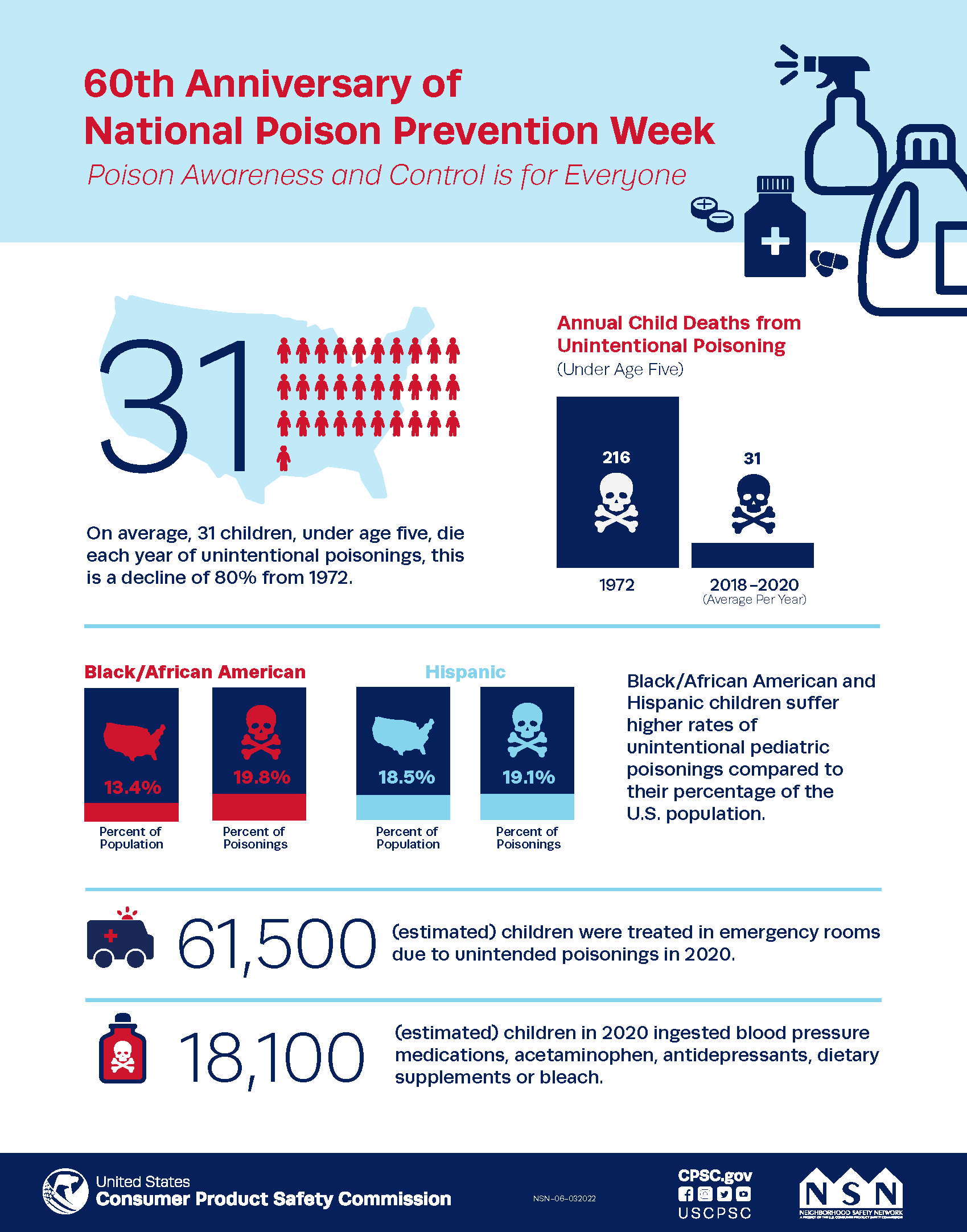WASHINGTON, D.C. – During the 60th anniversary of National Poison Prevention Week (March 20-26, 2022), the U.S. Consumer Product Safety Commission (CPSC) encourages consumers to safeguard their families from poisonings by taking control of potentially harmful household products and medications. Nearly nine out of 10 unintentional poisonings occur in the home.
“Decades of diligence and collaborative efforts have contributed to a dramatic decline in children being poisoned,” said Alexander Hoehn-Saric, Chair of the U.S. Consumer Product Safety Commission. “Yet, progress is not guaranteed. Recent increases in fatalities demonstrate the need for continued vigilance and work to limit and eventually eliminate these preventable tragedies.”
National Poison Prevention Week began in 1962. Since then, the poison prevention community, which includes the American Association of Poison Control Centers, standard development organizations, consumer advocates, medical professionals, industry and government have worked together to address pediatric poisoning. This includes legislative efforts, such as the Poison Prevention Packaging Act (PPPA) of 1970 and the Child Nicotine Poisoning Prevention Act of 2015, as well as voluntary standard efforts to introduce liquid flow restrictors for oral liquid drug products in 2015.
According to CPSC’s 2022 Annual Report on Pediatric Poisoning Fatalities and Injuries, on average, 31 children under the age of five die in the U.S. each year of unintentional poisonings from consumer products found in the home. This is a decline of 80% from 1972, when 216 children died. In 2018, the number of reported fatalities dropped to 17, the lowest figure since reporting began in 1972.
Unfortunately, fatalities have increased over the past several years. Pediatric poisoning fatalities doubled to 34 in 2019, and they increased by 26 percent in 2020, reaching 43 fatalities for the year. Narcotics, such as opioids, made up almost half of these deaths.
Although it is too early to know whether recent increases are indicative of a trend, or if they are outliers, clearly the COVID-19 pandemic has led families to spend more time indoors. This increases the risk of unintentional poisonings that could result in injury or death, especially for children and older adults. In the first nine months of the pandemic–from March to December 2020–there was a 62 percent increase in battery-related injuries for children ages five to nine and a 72 percent increase in serious injuries related to cleaning agents.
CPSC’s report also looked at race and ethnicity and found that Black children suffer a higher rate of unintentional pediatric poisonings, 19.8 percent, compared to their percentage of the U.S. population of 13.4 percent. Hispanic children have a slightly higher rate of pediatric poisonings, 19.1 percent, compared to their percentage of the population of 18.5 percent.
Poison dangers to children come in many different forms, from medicines and household chemicals to coin-size batteries and liquid nicotine. In 2020, blood pressure medications, acetaminophen, antidepressants, dietary supplements and bleach were among the top five most unintentionally ingested substances by young children.
CPSC encourages family members and caregivers to identify products in their homes that could be a danger and keep these products out of a child’s sight and reach.
Safety tips for parents and caregivers:
- Keep chemicals, medications and cleaning supplies safely stored in a locked cabinet or box, out of the reach of children.
- Keep medicines and household chemicals in their original, child-resistant containers.
- Do not let children handle laundry detergent packets.
- Store laundry detergent packets in their original containers, out of a child’s sight and reach.
- Coin-size button batteries, used in all sorts of electronics, are dangerous if swallowed. Do not leave products with accessible button batteries within reach of children and use tape to help secure a battery compartment that does not have a screw closure.
- Call Poison Help (800-222-1222) immediately if a child swallows or is exposed to the chemicals.
About the U.S. CPSC
The U.S. Consumer Product Safety Commission (CPSC) is charged with protecting the public from unreasonable risk of injury associated with the use of thousands of types of consumer products. Deaths, injuries, and property damage from consumer product-related incidents cost the nation more than $1 trillion annually. Since the CPSC was established more than 50 years ago, it has worked to ensure the safety of consumer products, which has contributed to a decline in injuries associated with these products.
Federal law prohibits any person from selling products subject to a Commission ordered recall or a voluntary recall undertaken in consultation with the CPSC.
For lifesaving information:
- Visit CPSC.gov.
- Sign up to receive our email alerts.
- Follow us on Facebook, Instagram, X, BlueSky, Threads, LinkedIn and Truth Social.
- Report a dangerous product or a product-related injury on www.SaferProducts.gov.
- Call CPSC’s Hotline at 800-638-2772 (TTY 800-638-8270).
- Contact a media specialist.
Please use the below phone number for all media requests.
Phone: (301) 504-7908
Spanish: (301) 504-7800


